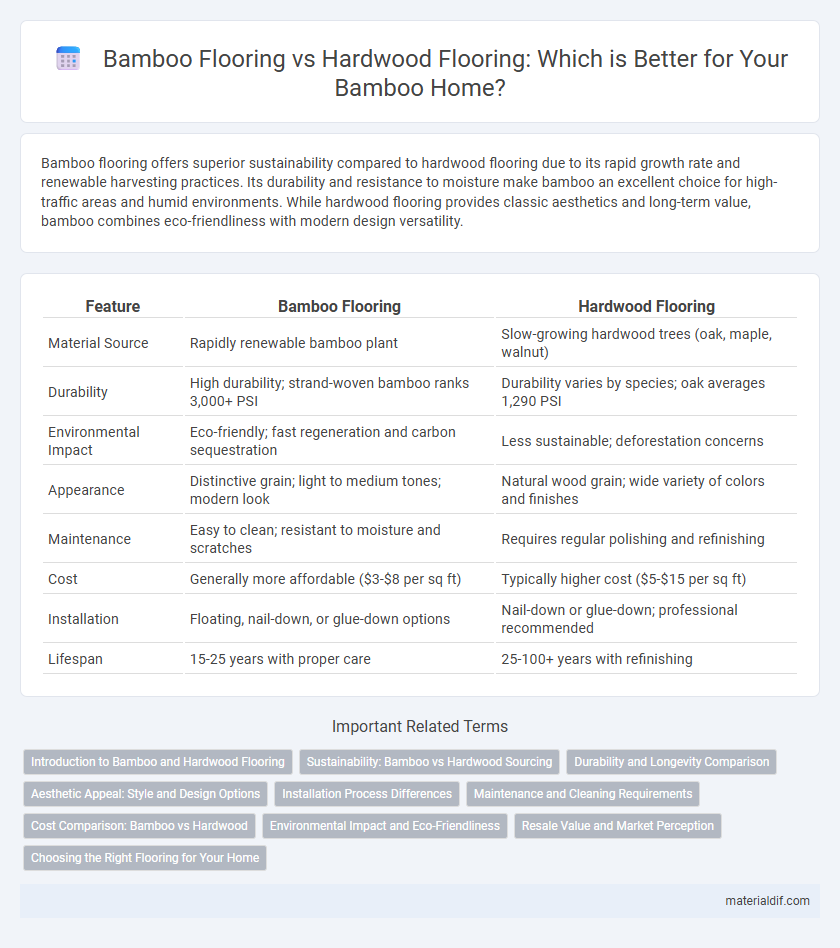Bamboo flooring offers superior sustainability compared to hardwood flooring due to its rapid growth rate and renewable harvesting practices. Its durability and resistance to moisture make bamboo an excellent choice for high-traffic areas and humid environments. While hardwood flooring provides classic aesthetics and long-term value, bamboo combines eco-friendliness with modern design versatility.
Table of Comparison
| Feature | Bamboo Flooring | Hardwood Flooring |
|---|---|---|
| Material Source | Rapidly renewable bamboo plant | Slow-growing hardwood trees (oak, maple, walnut) |
| Durability | High durability; strand-woven bamboo ranks 3,000+ PSI | Durability varies by species; oak averages 1,290 PSI |
| Environmental Impact | Eco-friendly; fast regeneration and carbon sequestration | Less sustainable; deforestation concerns |
| Appearance | Distinctive grain; light to medium tones; modern look | Natural wood grain; wide variety of colors and finishes |
| Maintenance | Easy to clean; resistant to moisture and scratches | Requires regular polishing and refinishing |
| Cost | Generally more affordable ($3-$8 per sq ft) | Typically higher cost ($5-$15 per sq ft) |
| Installation | Floating, nail-down, or glue-down options | Nail-down or glue-down; professional recommended |
| Lifespan | 15-25 years with proper care | 25-100+ years with refinishing |
Introduction to Bamboo and Hardwood Flooring
Bamboo flooring offers a sustainable and eco-friendly alternative to traditional hardwood flooring, known for its rapid growth and renewable properties. Hardwood flooring, derived from solid trees like oak, maple, or walnut, provides classic durability and a timeless aesthetic with natural grain patterns. Both flooring options present distinct benefits in terms of installation, maintenance, and environmental impact, making them popular choices for modern interiors.
Sustainability: Bamboo vs Hardwood Sourcing
Bamboo flooring is hailed for its sustainability due to rapid growth and renewability, typically maturing in 3-5 years, unlike hardwood trees that can take decades to mature. Bamboo's cultivation has a lower environmental footprint, requiring fewer pesticides and less water compared to traditional hardwood harvesting, which involves extensive deforestation and habitat disruption. Certified sustainably sourced bamboo flooring supports eco-friendly building practices, while hardwood options vary significantly based on tree species and forestry management practices.
Durability and Longevity Comparison
Bamboo flooring exhibits exceptional durability due to its natural hardness, often surpassing traditional hardwood varieties such as oak or maple. Its high tensile strength and resistance to dents and scratches contribute to a longer lifespan, typically lasting 20 to 25 years with proper maintenance. Hardwood flooring, while offering classic aesthetic appeal, generally requires more frequent refinishing and may be more prone to wear in high-traffic areas compared to strand-woven bamboo options.
Aesthetic Appeal: Style and Design Options
Bamboo flooring offers a sleek, contemporary aesthetic with natural grain patterns and a variety of finishes, ranging from light blonde to deep caramel tones, enhancing modern and minimalist interiors. Hardwood flooring provides a timeless, classic appeal with diverse species such as oak, maple, and walnut, available in multiple stains and textures that complement traditional and rustic decor. Both materials deliver versatile design options, allowing customization to suit different architectural styles and personal tastes.
Installation Process Differences
Bamboo flooring typically features a click-lock installation system that allows for a faster and more straightforward floating floor setup compared to hardwood, which often requires nailing or gluing. The moisture resistance of bamboo reduces the need for extensive subfloor preparation, while hardwood demands a dry, level base to prevent warping. Bamboo's consistent plank size simplifies cutting and fitting, making it more DIY-friendly than hardwood, which may require specialized tools and skills.
Maintenance and Cleaning Requirements
Bamboo flooring requires less maintenance than traditional hardwood due to its higher resistance to moisture and scratches, making it ideal for high-traffic areas. Regular sweeping and occasional damp mopping with a pH-neutral cleaner help preserve its appearance without the need for frequent refinishing, unlike hardwood which often demands periodic sanding and resealing. Bamboo's natural durability combined with low-maintenance cleaning protocols reduces long-term upkeep costs compared to conventional hardwood floors.
Cost Comparison: Bamboo vs Hardwood
Bamboo flooring typically costs between $2 to $6 per square foot, making it a more budget-friendly option compared to hardwood flooring, which ranges from $5 to $15 per square foot depending on the wood species. Installation costs for bamboo are generally lower due to its uniformity and ease of handling, whereas hardwood may require specialized labor, increasing overall expenses. Bamboo offers a cost-effective alternative without compromising on durability, providing significant savings in both materials and installation compared to traditional hardwood floors.
Environmental Impact and Eco-Friendliness
Bamboo flooring has a significantly lower environmental impact than traditional hardwood flooring due to its rapid growth rate and sustainable harvesting practices, allowing bamboo to regenerate within 3-5 years compared to decades for hardwood trees. Bamboo's carbon sequestration abilities outperform many hardwood species, making it an eco-friendly choice that helps reduce greenhouse gas concentrations. Additionally, bamboo cultivation requires fewer pesticides and fertilizers, contributing to healthier soil and reduced water pollution.
Resale Value and Market Perception
Bamboo flooring often offers competitive resale value due to its durability and eco-friendly appeal, attracting environmentally conscious buyers in the real estate market. Hardwood flooring maintains strong market perception as a classic, high-end material, often commanding higher property prices in upscale neighborhoods. Both options influence home value, but hardwood typically holds a more established reputation, while bamboo gains traction for sustainability trends.
Choosing the Right Flooring for Your Home
Bamboo flooring offers exceptional durability and eco-friendliness, making it an ideal choice for environmentally conscious homeowners seeking sustainable options. Hardwood flooring provides classic aesthetics and long-lasting value, suitable for those prioritizing timeless elegance and resale appeal. Selecting the right flooring depends on factors such as budget, maintenance preferences, and desired style, ensuring a balance between functionality and design.
Bamboo flooring vs hardwood flooring Infographic

 materialdif.com
materialdif.com